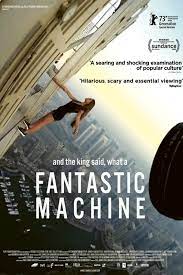
AND THE KING SAID: WHAT A FANTASTIC MACHINE
Denmark, Sweden, 2023, 88 minutes, Colour.
Directed by Axel Danielson, Maximilian Van Aertryk.
In just under an hour and a half, this documentary sweeps over the history of photography, cinema, television, social media. Some have noted that it is a celebration. Others that it is a homage.
The summary synopsis best describes it:
From the first camera to 45 billion cameras worldwide today, the visual sociologist filmmakers widen their lens to expose both humanity's unique obsession with the camera's image and the social consequences that lay ahead.
It is interesting to note that the writers-directors are called visual sociologist filmmakers. This film is in no way an equivalent of a visual sociological thesis. Rather, it is illustrated, highlights picked out, jumping about in chronology, moving from one country to another, something of a 90 minutes, display of the themes. While it is enjoyable, with so much visual material to appreciate, respond to, relish, and, and so many questions and issues raised, it does not give the audience much time to reflect as they watch.
Depending on attitudes towards photography, television watching, the commercialisation of media, slick packaging, the difference between programs and shows, points of view will be reinforced or irritated. One blogger summed it up: just a kaleidoscopical and anecdotical series of ideas. JvH843.
With that said as something of a caution, or an alert to an audience keen on an overview of the visual capturing of images, there is a lot of material that is striking. For instance, going back to the original photo in 1828, Daguere and developments, the camera obscura moving to cameras, Muybridge and the galloping horse, the Lumiere Brothers and their screening of their one-minute capturing of daily realities, to the British William Friese-Greene (with generous clips from the 1951, The Magic Box, Robert Donat in the title, showing a film of Hyde Park to the disbelieving police constable, in fact played by Laurence Olivier).
A great deal of attention is given to the post-war popularity of television, in the United States, transatlantic transmissions. As regards the straightforwardness of television in those times to the pace colour and editing of contemporary promotion, a striking collage.
A lot of attention is given to situations for news reporting, and freezing cold in Moscow, waiting for a two minute interview…
But, of course, while Edward VII is quoted for the title after he has watched a re-creation of his coronation, filmed in France before the event, screened in England at the time of the event, any camera is a wonderful machine.
And, finally, huge statistics of how many photos are taken every day, how many photos published, lots of sequences where all kinds of people pose, have their poses rearranged, invitations to smile from the photographer, willingness and unwillingness,... And, then on to YouTube, sequences going viral, everybody with their own program, expert on everything, and a great number of clips to illustrate this.
And, by the final credits, we might be both overwhelmed and exhilarated, wondering what kind of a world we live in and, photographically speaking, where we are going.